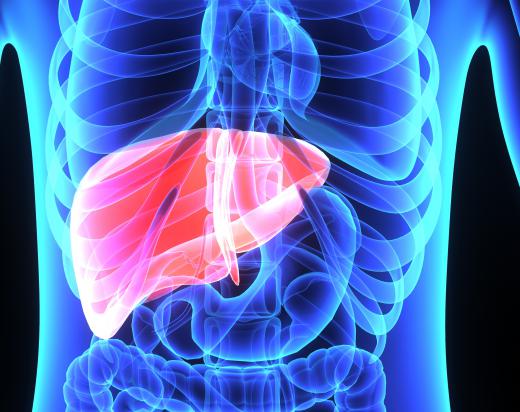What is a Transferase?
 Mary McMahon
Mary McMahon
A transferase is an enzyme which is designed to transfer a functional chemical group from one molecule to a different molecule. Over 450 transferases have been recognized, and researchers are periodically uncovering new ones as they learn more about biology and the complexities of the body. Deficiencies in certain transferases can cause health problems, and transferases also play a vital role in a wide variety of activities, including research and study in the field of biology.
The enzyme which contributes a chemical group is known as the donor, and the enzyme which accepts the group is known as the receptor. Within the large family of transferases, there are a number of subgroups, generally named for the types of chemical groups they hande. Transaminases, for example, transfer amino groups, while DNA methyltransferases transfer methyl groups. Each known transferase is also given a specific identity based on the particular chemical group it handles and the types of molecules it interacts with.

Certain medications take advantage of the actions of transferases inside the body. Transferase inhibitors impair the actions of transferases, preventing them from transferring chemical groups successfully. This can be used to fight a variety of diseases. In people who have a transferase deficiency, on the other hand, medication must be administered to make up for the lack of action on part of transferases to avoid dangerous buildups of chemical groups in the body.
Transferases play an important role in metabolism, helping the body break down and process complex molecules. If there are errors in this process, chemical groups can build up in the body, as the body lacks the ability to process these groups appropriately. For example, enzymes produced in the liver act to break down toxins processed by the liver; if the liver is overloaded with toxins, it may not be able to produce enzymes quickly enough, and someone could get sick.
Levels of certain transferase enzymes in the body can be tested, classically through the use of a blood test in which a screen for various enzymes of interest can be performed. An enzyme panel, as it is known, may be requested to learn more about a patient's underlying medical condition, or to monitor an ongoing medical problem. Normal values on an enzyme panel vary, depending on several factors, and the test results usually need to be interpreted by a doctor to determine whether or not the levels are of concern.
AS FEATURED ON:
AS FEATURED ON:











Discussion Comments
The more I read about our bodies and how to stay healthy, the more I realize how important enzymes are to optimal health.
So many times we are aware of the vitamins and minerals we need, but don't think much about the importance of enzymes.
While I am not familiar with the chemical components of something like glycosyl transferase, I do know they are important for my metabolism and overall health of my gut when it comes to digestion.
Many people struggle with digestion and metabolism issues and getting the right amount of enzymes to help with this can be beneficial for our whole bodies.
When I began adding some enzymes to the supplements I was taking, I couldn't believe how much better I felt.
Post your comments